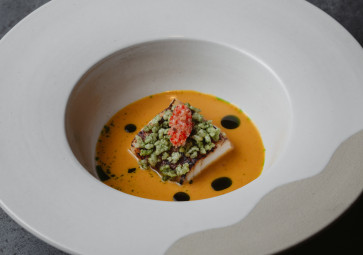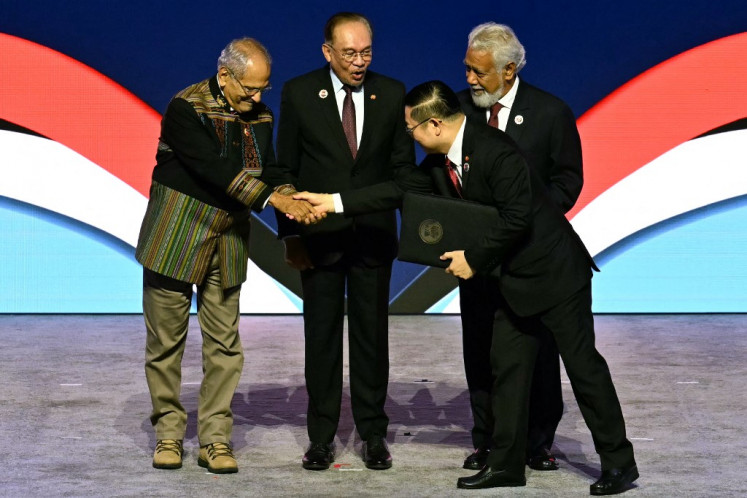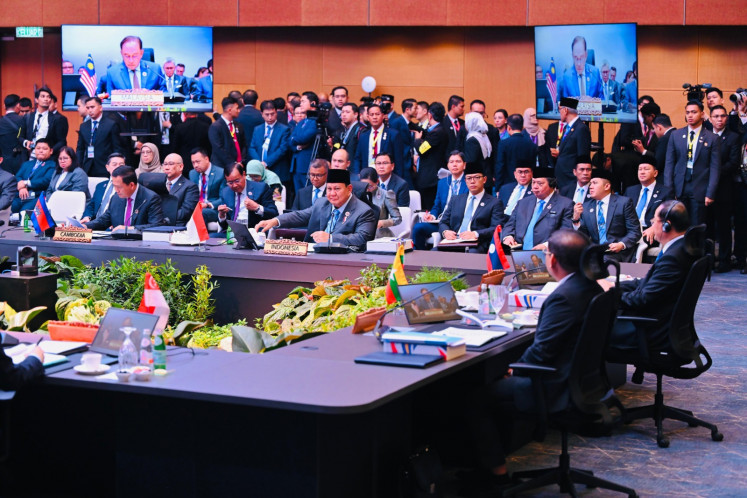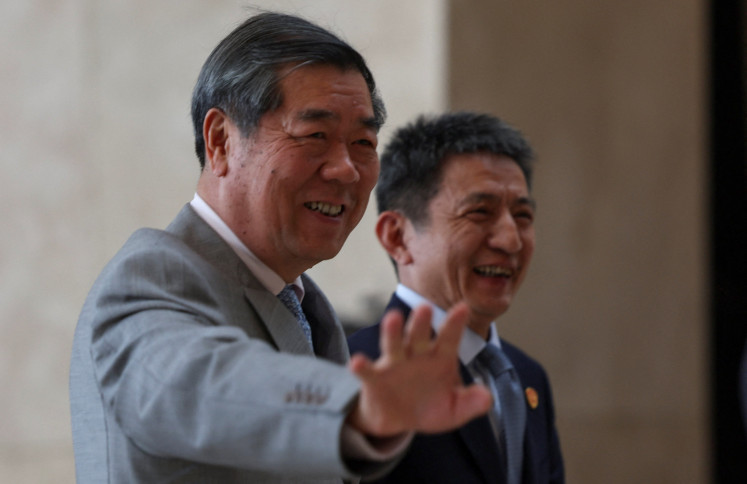Popular Reads
Top Results
Can't find what you're looking for?
View all search resultsPopular Reads
Top Results
Can't find what you're looking for?
View all search resultsAutomakers get tax breaks for low-cost green cars
Indonesiaâs car makers are soon expected to begin the production of more affordable cars, following the governmentâs decision to provide long-awaited special tax breaks for so called eco-friendly vehicles
Change text size
Gift Premium Articles
to Anyone
I
ndonesia's car makers are soon expected to begin the production of more affordable cars, following the government's decision to provide long-awaited special tax breaks for so called eco-friendly vehicles.
Under the government regulation, signed by President Susilo Bambang Yudhoyono on May 23, the producers of green automobiles will receive a reduction of a luxury-goods sales tax as low as zero percent.
Industry Minister MS Hidayat said in Jakarta on Wednesday that with the announcement of the tax breaks, the country's car makers would soon be able to start the production of the low-cost cars because they had prepared the car production program for a long time.
'This rule will set the trend for green cars, which can reduce fuel consumption and use other alternative energy sources,' he said.
Apart from that, the tax incentives might further spur growth in the domestic automotive industry, paving the way for Indonesia to become a key player in the inexpensive eco-car sector in the Southeast Asian market, prominent global research firm Frost & Sullivan estimates.
As stipulated in the rule, the biggest tax break will go to producers of affordable eco-cars, dubbed 'low cost green cars', who are freed from the duty to pay the tax.
The inexpensive, fuel efficient cars are divided into two categories: cars with gasoline engines of up to 1,200 cc and diesel and semi-diesel engines of up to 1,500 cc. Both types of cars should be able to run at least 20 kilometers per one liter of fuel.
The makers of other eco-cars, referred to as 'low-carbon emission cars', will also benefit from the tax cut whenever they utilize a variety of engines, such as advance diesel/gasoline, biofuel, hybrid and gas, with efficient energy consumption.
Producers of vehicles that can run 20 to 28 kilometers on one liter of fuel can obtain a 25 percent discount of the sales tax, while makers of cars that can travel more than 28 kilometers per liter of fuel will enjoy a 50 percent tax cut.
The new tax cut will effectively help push down the prices of cars to around Rp 100 million (US$10,106), a benchmark considered to enable them to reach out to the Indonesian masses, particularly the emerging middle-class that is shifting from used cars or motorcycles.
Existing subcompact cars in the market that have similar engine capacities are now priced between Rp 135 million and Rp 170 million.
Automotive giants Toyota Astra Motor (TAM) and Astra Daihatsu Motor (ADM), which are currently developing their new flagship low cost green cars, the Toyota Agya and the Daihatsu Ayla, could be the first to benefit from the tax breaks.
ADM earlier said that both cars were designed with 84 percent of their assembly features locally sourced, which meets the requirement in a draft of the technical rule prepared by the Industry Ministry to implement the new rule on eco-car incentives.
The draft demands that car makers locally source 80 percent of a vehicle gradually within five years, Industry Ministry director general for high-technology based priority industry Budi Darmadi said.
ADM marketing director Amelia Tjandra said Daihatsu would soon roll out Ayla in the next two months after the administrative procedures to access the tax break were cleared.
Daihatsu is targeting to sell 3,000 units of the Ayla per month, one-fifth of its monthly sales and once it is attained, it will help the firm maintain a market share of 15 percent this year.
Other major manufacturers, such as Suzuki and Nissan, are also expected to offer their affordable eco-cars soon. Japan's second-biggest automaker, the Nissan Motor Co. Ltd., for example, is preparing its inexpensive eco-cars under its heritage brand, the Datsun, to battle for a piece of the Indonesian market, one of the world's most promising.
Teddy Irawan, the vice president director for marketing and sales of Nissan Motor Indonesia (NMI), confirmed that the car Nissan was preparing could comply with the basic requirements on fuel consumption.
'Hopefully, we can also fulfill other requirements so that we can participate according to our initial plan,' he said, adding that the first production of Nissan eco-cars could begin as early as next year.
Car sales in Southeast Asia's second biggest auto market are expected to climb by around 10 percent to 1.2 million units this year. In the January-April period, sales surged by 17.79 percent to 398,108 units from the past year.










